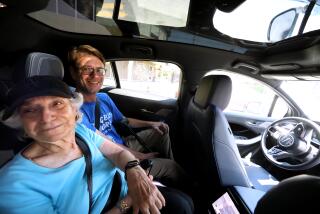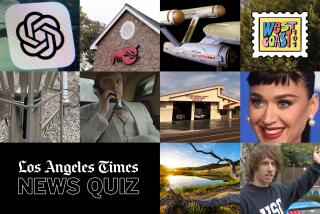Newsletter: California Inc.: China accelerates plans for self-driving cars
Welcome to California Inc., the weekly newsletter of the L.A. Times Business Section.
I’m Business columnist David Lazarus, and here’s a rundown of upcoming stories this week and the highlights of last week.
Friday brought news that California gained 46,000 jobs last month, while the unemployment rate held steady at 4.3% — near a record low. The gains marked an improvement over March, when payrolls in the state grew by an upwardly revised 28,500 jobs.
LOOKING AHEAD
Housing market: The latest snapshot of existing U.S. home sales comes out Tuesday amid a weakening market. Sales ran at a seasonally adjusted annual 5.21 million rate in March, which was 4.9% lower than February’s pace despite lower mortgage rates and rising wages that have improved affordability.
Fed minutes: Details will emerge Wednesday from the most recent meeting of the central bank’s Federal Open Market Committee. At their March 19-20 gathering, Fed officials left room for the possibility of interest rate increases before the end of the year, should economic conditions improve, but most said they expect the rate to remain unchanged.
Durable goods: Durable goods orders — think appliances, furnishing and electronics — will be released by the Commerce Department on Friday. New orders for American-made capital goods increased by the most in eight months in March.
Rub here: “Aladdin,” the latest, not-at-all-cynical, live-action remake by Disney of one of its cartoons, comes out Friday. Much is riding on how Will Smith’s Genie compares with Robin Williams’. For creepier fare, check out “BrightBurn,” which asks the question, “What if Superman wasn’t such a nice guy?”
THE AGENDA
Monday’s Business section steers into the market for self-driving vehicles, which China is determined to grab a bigger piece of. The Chinese government set next year as the target date for large-scale adoption of early-stage autonomous vehicles, and it wants 10% of all new vehicles sold by 2030 to be fully autonomous — meaning hands-off driving. Needless to say, Chinese businesses, which are lagging those in the U.S., are determined to deliver.
STORY LINES
Here are some of the other stories that ran in the Times Business section in recent days that we’re continuing to follow:
Widening war: The collateral damage wrought by the U.S.-China trade dispute mounted last week as President Trump banned Huawei from American markets and appeared to threaten to impose export controls that could cripple the Chinese telecom giant. Experts said tariffs could cause Apple to either raise prices or lower profits on its iPhones, while Volvo might not import its new all-electric vehicle. Both products are made in China.
Uber repercussions: Shares of the ride-hailing company continued to lag last week below its initial public offering price of $45, boding ill for some upcoming Silicon Valley IPOs. The poor performance of the May 10 offering that raised $8.1 billion caused some to cast blame on lead underwriter Morgan Stanley, which critics said hyped the stock, overpriced the offering and then failed to lend enough market support.
Streaming deal: Telecommunications giant AT&T sold its nearly 10% interest in Hulu for $1.43 billion, returning its stake in the streaming service now controlled by Walt Disney Co. AT&T said the deal, announced Monday, valued the Santa Monica-based streaming service at $15 billion. AT&T was expected to sell its interest in Hulu as AT&T’s WarnerMedia starts its own streaming service later this year.
Antitrust decision: The Supreme Court gave a boost to antitrust laws in the digital era when Justice Brett M. Kavanaugh, joined by the court’s four liberal justices, rejected Apple’s defense that it could not be sued over its App Store prices because it’s a third-party sales platform. The ruling potentially opens the way for similar lawsuits against other tech platforms with similar business models.
Studio City remodel: Sportsmen’s Lodge has a storied past as one of the San Fernando Valley’s most cherished institutions. Its owner said work will begin in August on a $100-million redevelopment that will transform the Ventura Boulevard landmark into an upscale shopping and dining destination, with 23 shops and restaurants, an Erewhon Organic Grocer & Cafe and an Equinox gym.
WHAT WE’RE READING
And some recent stories from other publications that caught our eye:
Stream dreams: Cash-strapped Vice Media needs to come up with a new game plan, and that plan centers on its studio, the New York Times says. The idea is to “drastically increase the number of television shows the company produces for outside buyers while continuing to make a smattering of sharp-edged feature films.”
Crisis ahoy: Housing is so expensive in the Bay Area that the homeless are now floating offshore, the Wall Street Journal observes. “The boating homeless include some who are employed but say they can’t afford to live on land, some who prefer the independence and others who are jobless or mentally ill. The seafaring life isn’t easy for any of them.”
Just sick: Doctors are running out of effective antibiotics because we’re not making them, Newsweek warns. “Although researchers have many good leads, the bigger problem is a lack of financial incentives to bring new treatments through the drug-development gantlet.”
Crazymaking: Bloomberg Businessweek examines the challenge of mental-health coverage. “In 2017, 47,000 Americans died by suicide and 70,000 from drug overdoses. And 17.3 million adults suffered at least one major depressive episode.… Even so, insurers are denying claims, limiting coverage and finding other ways to avoid complying with the law.”
Looking good: From the New Yorker, a look at YouTube wars among beauty influencers. “An influencer is, by definition, a creature of commerce. Unlike with a traditional celebrity, there is no creative project necessary to back up the shilling of products (say, a movie franchise used to promote merchandise) — the shilling is the project.”
SPARE CHANGE
Wired serves up a video of an MIT scientist lamenting that he can’t make a machine that smells better than a dog (by which I mean that it excels at olfactory endeavors, not that it has a pleasing bouquet). Dogs can smell explosives like landmines, and detect medical conditions including seizures, diabetes and many forms of cancer — with up to 98% accuracy. But inventor Andreas Mershin can’t even say why.
For the latest money news, go to www.latimes.com/business. Mad props to Laurence Darmiento for helping put this thing together.
Until next time, I’ll see you in the Business section.
More to Read
Inside the business of entertainment
The Wide Shot brings you news, analysis and insights on everything from streaming wars to production — and what it all means for the future.
You may occasionally receive promotional content from the Los Angeles Times.











